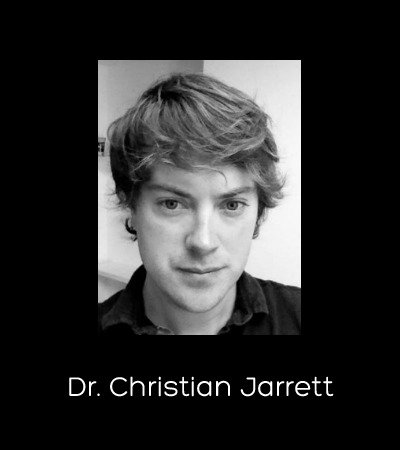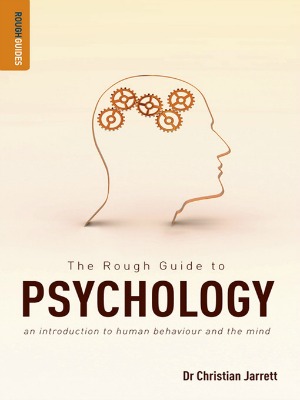Interview with Dr. Christian Jarrett
Dr. Christian Jarrett has a PhD in cognitive neuroscience and is a chartered psychologist and associate fellow of the British Psychological Society (BPS). He edits the BPS Research Digest blog and is the presenter of the British Psychological Society podcast 'PsychCrunch.'
Dr. Jarrett writes a column on personality and a column on productivity for BBC Future and 99U.com respectively and he is also an expert panelist for BBC Focus. Previously, he has written articles on brain sceince for New York Magazine, WIRED, and Psychology Today. His latest book, 'PERSONOLOGY, Using the Science of Personality Change to Your Advantage' is due out soon.
Q & A
You are a cognitive neuroscientist by training. What is cognitive neuroscience?
It's where neuroscience and cognition meet, so it's about trying to understand how the brain as a biological entity carries out mental processes like memory and language. My PhD research involved trying to explain anticipatory eye movements in terms of the functioning of various networks at the front of the brain.
You have written and edited the British Psychological Society (BPS) Research Digest blog since its launch in 2005. One of the aims of the blog is to evaluate important studies which are relevant to real life. What would you say are the most common "real life" topics featured on the blog?
Mental health is one of the major "real life" topics that I cover but others include decision making, emotions and relationships.
CLICK HERE to read the BPS Research Digest Blog.
Could you tell us about your book Great Myths of the Brain?
I've had a great time writing this book, but it's also been daunting because the science is progressing all the time. I've looked at historical myths such as the outdated idea that mental function resides in the brain's ventricles (the fluid-filled hollows); classic myths, which includes things like the belief that we only use 10 per cent of our brains, and that right-brained people are more creative; myths about brain structure, such as that bigger brains are necessarily smarter and that mirror neurons are what makes us human; technological myths, such as that fMRI can literally read our minds and that the internet is making us stupid; perceptual myths like the notion that we see the world how it really is; and illness-related myths, to do with epilepsy, dementia, amnesia plus much more. See following link for details.
As somebody who has written on the subject which psychology theory do you think is the most thought-provoking and why?
One of the most thought-provoking is certainly cognitive dissonance theory - the idea that we find it uncomfortable to hold two or more contradictory beliefs in mind at the same time, and that we seek ways to reduce this mental conflict.
When these beliefs relate to ourselves it's amazing how far we'll go to distort reality so as to protect our own self-image. The consequences can be truly far-reaching and even dangerous. There's an amazing book Mistakes Were Made But Not By Me by Carol Tavris and Elliot Aronson - that documents this phenomenon through real life stories of scandals and misdemeanours.
As part of a special ‘sin week’ on the (BPS) Research Digest blog you examined the relevance of the idea of sin to modern life. Psychologically speaking which of the Seven Deadly Sins did you find most interesting?
I have to pick envy because I've just finished reading a wonderful new book by Richard Smith called The joy of pain: Schadenfreude and the dark side of human nature. Smith explores how envy is one of the main catalysts that can make other people's misfortune pleasurable for us. What's disturbing is that we can sometimes convince ourselves that a person we envy deserved their suffering ... and in extreme cases we'll use this rationale to go so far as to orchestrate the envied person's downfall. Smith explores how these twisted psychological processes may even have played a part in the holocaust.
TED lesson on the psychology of ownership by Dr. Christian Jarrett
What can readers expect from your critically acclaimed book The Rough Guide to Psychology?
Hopefully it provides a jargon-free, engaging and honest look at the whole breadth of psychology. It's a much lighter read than a text book and I've tried to fill it with loads of intriguing and useful facts that you'll want to share with friends. But it also covers all the main bases in psychology - the latest views on the classic studies and theories.
I love psychology and believe it can help improve our lives and help solve society's problems. But I'm also skeptically minded. Hopefully both those perspectives shine through. See following link for full details.
Do you have any best practice tips or advice for students doing a psychology research project?
Choose a research question that you genuinely find intriguing - this will really help with your motivation. Also, don't get carried away and try to win a Nobel prize with this piece of research. I've seen students get bogged down with overly ambitious projects that take too long. Be realistic about what you can achieve, study the topic thoroughly, plan well, seek any necessary guidance and advice you need, and make sure you leave time for writing it up carefully. Above all - enjoy the chance to find out something new!
Great Articles By Dr. Christian Jarrett
Why The Left-Brain Right-Brain Myth Will Probably Never Die
Three Myths and Three Facts About Left-Handers
Real Life Cases of Amnesia That Are Stranger Than Fiction
Connect With Dr. Christian Jarrett
Click Here to visit Dr. Christian Jarrett's website.
Click Here to connect with Dr. Christian Jarrett on Twitter.
Click Here to connect with Dr. Christian Jarrett on Facebook
Recent Articles
-
Healthcare Leadership: Why Management Matters in Patient Care
Jan 09, 26 02:04 PM
Strong healthcare leadership improves patient care, staff wellbeing, and system efficiency. Explore why effective management matters in modern healthcare. -
Jack El-Hai Interview: Psychology, History, and Writing
Jan 08, 26 05:46 AM
An in-depth interview with Jack El-Hai on psychology, history, and writing complex human stories behind medicine, crime, and moral choice. -
Psychology Articles by David Webb
Jan 06, 26 02:10 PM
Discover psychology articles by David Webb, featuring science-based insights into why we think, feel, and behave the way we do.
Go To The Psychology Expert Interviews Page








